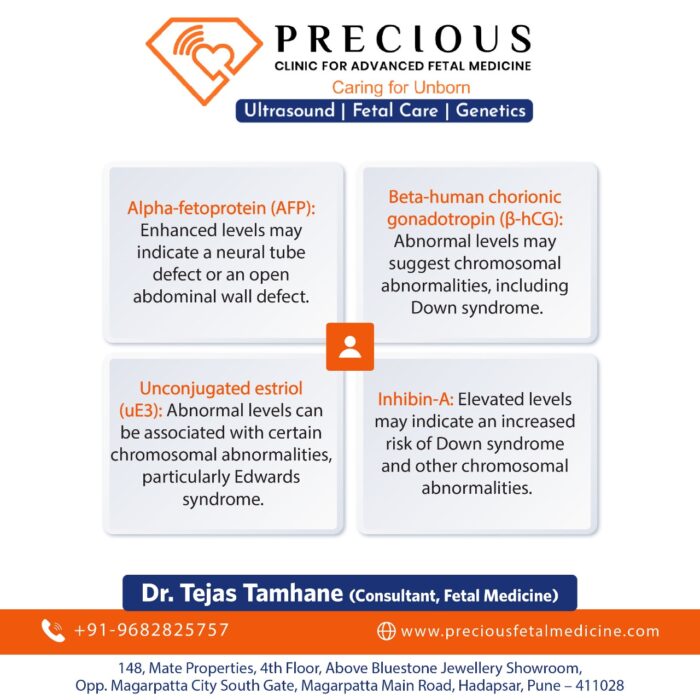In this blog, we will discuss the Quadruple Marker Test, including what it is, when it is normally done during pregnancy and its importance in prenatal care.
Understanding the Quadruple Marker Test
A blood test called the Quadruple Marker Test sometimes referred to as the Quad Screen, is typically administered to pregnant women between the 16th and 21st week of their pregnancy. A sample of the mother’s blood is drawn for this non-invasive test, which will be used to examine particular markers or chemicals. The exam measures the following markers:

- Alpha-fetoprotein (AFP): AFP is a protein made by the liver of the developing foetus and is present in amniotic fluid and the mother’s blood. A neural tube defect or an open abdominal wall defect may be indicated by abnormal AFP levels.
- Human Chorionic Gonadotropin (hCG): The placenta produces the hormone hCG. While lower amounts may be linked to conditions like Edwards syndrome (Trisomy 18), elevated levels of hCG may indicate a higher risk of Down Syndrome. (Trisomy 21)
- Unconjugated estriol (uE3): The placenta and the newborn both create estriol, a hormone. Several birth abnormalities and chromosomal problems have been connected to abnormal amounts of estriol.
- Inhibin-A: The placenta produces the protein known as inhibin-A. Elevated Inhibin-A levels may be a sign of a higher risk of Down syndrome or other chromosomal disorders.
(Also Read: NIPT (Non-Invasive Prenatal Test): What to Expect? (preciousfetalmedicine.com))

Why Is the Quadruple Marker Test Important?
The Quadruple Marker Test serves several important purposes in prenatal care:
- Birth defect screening: This test’s main objective is to check for chromosomal abnormalities and common birth disorders including Down syndrome, neural tube problems, and some of the other common chromosomal problems.
- Risk evaluation: The test estimates the baby’s risk for various conditions. An “abnormal” result doesn’t always mean the baby has a health problem, but it does suggest a higher risk and calls for additional testing.
- Informed Decision-Making: The Quadruple Test results give expectant parents the knowledge they can use to make informed decisions. They can choose to undergo additional, more invasive tests, such as amniocentesis to confirm or rule out potential issues.
- Emotional Preparation: For some parents, knowing in advance about a potential health issue can be emotionally beneficial. If the test findings show a problem, it enables them to psychologically and emotionally get ready for the tough decisions they might have to take.

Interpreting Quadruple Marker Test Results
It’s important to note that the Quadruple Marker Test offers a screening, not a diagnosis. The results of the test are often identified as “low risk” or “high risk”, depending on whether the baby’s risk for specific conditions is normal or increased.
Remember that even if the results are abnormal, this does not necessarily mean that there’s a birth defect or genetic abnormality present. It simply suggests a higher likelihood, and that further diagnostic tests, such as amniocentesis may be recommended to provide a definitive diagnosis. Similarly, the “low risk” report also doesn’t mean that the baby is 100% not affected by these chromosomal problems. The most important point to remember is that this test has a detection rate of approx. 80 %.
In Conclusion
Expectant parents can evaluate their baby’s risk for common birth defects and chromosomal abnormalities with the Quadruple Test, a useful tool in prenatal care. Despite being a crucial part of prenatal screening, it’s crucial to keep in mind that this test only offers a probability or risk assessment, not a conclusive diagnosis. Consequently, if the Quadruple Marker Test findings are abnormal, fetal medicine consultants advise additional diagnostic tests.
Get the Quadruple Marker Test in Pune
Reach out to Dr. Tejas Tamhane, Fetal Medicine Consultant, to undergo a comprehensive Quadruple Marker Test in Pune, securing a healthy start for your baby.



